‘Proof’ at Court Theatre: Finding love, other prime factors in calculus of life’s choices
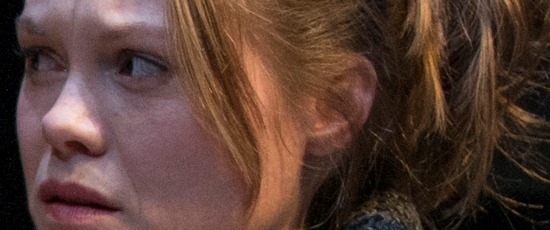 Review: “Proof” by David Auburn at Court Theatre through April 14. ★★★★★
Review: “Proof” by David Auburn at Court Theatre through April 14. ★★★★★
By Nancy Malitz
It opens like a puzzle box, David Auburn’s delicate and profound exploration of the chaotic aftermath of a genius father’s death and its effect on a daughter who has apparently put her life on hold to care for him.
Robert, the father, was a mathematical wunderkind. Catherine grew up breathing his air of prime numbers and complex calculations. Robert descended into terrifying mental tatters. Catherine’s extremely fragile herself. She is, quite literally, her father’s proof. Yet, what that really means comes out in a series of revelations, each a perfect theatrical moment.
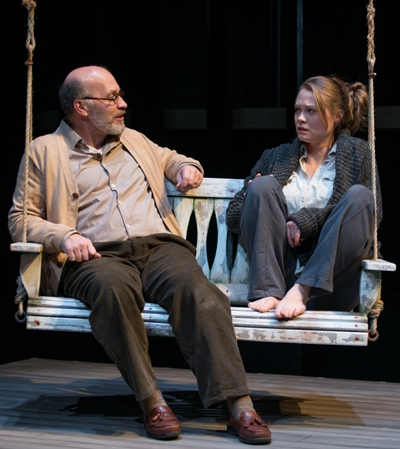 When we first encounter 25-year-old Catherine in Auburn’s Pulitzer Prize-winning play in Court Theatre’s outstanding production, we see her as a daughter having a conversation with her father, meandering from quotidian matters to numbers play and the usual inter-generational nagging.
When we first encounter 25-year-old Catherine in Auburn’s Pulitzer Prize-winning play in Court Theatre’s outstanding production, we see her as a daughter having a conversation with her father, meandering from quotidian matters to numbers play and the usual inter-generational nagging.
It takes some minutes before we begin to suspect that we’re inside a hallucinatory memory bubble, a moment of aching fantasy in a daughter’s mind disoriented by raw grief, panic and exhaustion. Robert is dead.
This play’s big moments are slam-bang pieces of stagecraft. “Proof” won both a Tony and a Pulitzer for Auburn in 2001, and we are past the point where the chronological events of the narrative will come as a surprise to everyone in the audience. I’ll not give much more away because first times are to savor. Who forgets gasping in shock when Romeo stabs Tybalt or marveling at Maggie’s cunning at Big Daddy’s birthday party? But when a play is really fine, and this one certainly is, appreciation deepens as the mind is left to relive those events and to linger over other aspects rich with interpretive possibility.
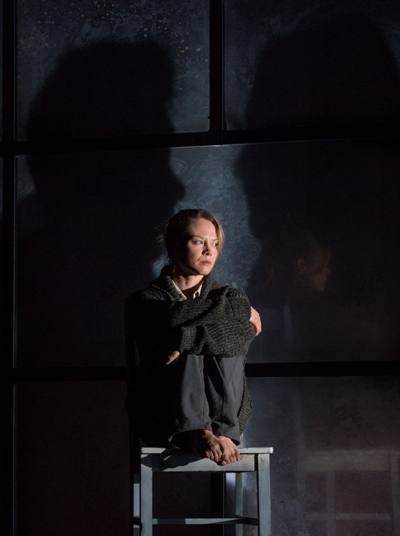 There is much to mull in the way Auburn sets up his secrets, and the psychological layering and insight in his dramatic narrative leaves plenty of room for the director, designer and actors to play around. Director Charles Newell takes an approach that burrows deep psychologically, but is lively, emotionally freeing and sometimes very funny.
There is much to mull in the way Auburn sets up his secrets, and the psychological layering and insight in his dramatic narrative leaves plenty of room for the director, designer and actors to play around. Director Charles Newell takes an approach that burrows deep psychologically, but is lively, emotionally freeing and sometimes very funny.
That a loved one’s death can also be a gift to the living is a thread in the play. But Catherine’s lusty impatience to grab what’s left of her life with both fists, however unstable and conflicted she feels in present grief, is a wonderful directorial idea for an actress to work with, and Chaon Cross gives it her all. Catherine’s behavior is deeply unsettling to those around her. The way to certain madness is being paved by people who love her most. But this Catherine has made a great leap of faith, born of shrewd instinct. She actually has some wits about her even though she’s a psychological wreck, and you can feel the audience pull to her side.
Auburn’s story occurs on the front stoop of a run-down Hyde Park home near the University of Chicago campus, and the local references to Hyde Park’s shadowy world of post-grad slackers and to academic rivalries with Northwestern bring uproarious laughs such as they never got on Broadway. But director Newell and set designer Martin Andrew have decided quite rightly that a realistic setting isn’t necessary at all. Andrew’s design is tantalizingly abstract — does the grid suggest a mental cage, or a riddle for solving?
Right away we know this is not a stable place, though curiously inviting. In the hours surrounding Robert’s funeral, Catherine’s older sister has come in from New York to help, only to destabilize matters further. Hal, a former student of Robert’s, whom Catherine vaguely knows and finds appealing, has also shown up on the stoop.
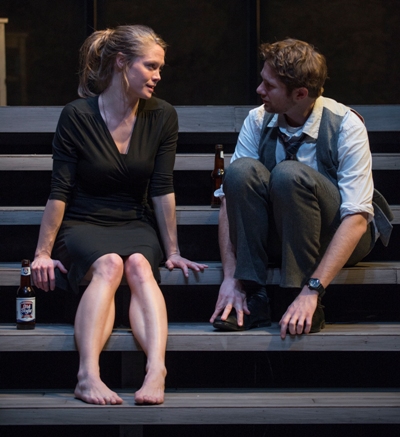 And thus the intimate quartet’s complete, unless you count the subconscious swells who make it a symphony. Father Robert plays a robust part, as the playwright knows do all recent dead. But Kevin Gudahl, as Robert, has found a subtle way to leave the question open about the motive (selfish? selfless? wise? unseeing?) in allowing his daughter to care for him when she is inclined at last to pull away and go to school. It’s an excellent performance.
And thus the intimate quartet’s complete, unless you count the subconscious swells who make it a symphony. Father Robert plays a robust part, as the playwright knows do all recent dead. But Kevin Gudahl, as Robert, has found a subtle way to leave the question open about the motive (selfish? selfless? wise? unseeing?) in allowing his daughter to care for him when she is inclined at last to pull away and go to school. It’s an excellent performance.
In dissertation purgatory, Hal (Eric Hellman) is secretly hoping there’s something left to discover in Robert’s late work that he might ride to a purpose. But he finds no small allure in Catherine’s casual brilliance, even as he spouts the prevailing wisdom that for mathematicians it’s all downhill after age 23 and women can’t do serious math anyway. Hellman’s Hal is a sexy nerd — hey, wait, only people outside academia think that’s a joke! — and makes us believers early on that he’s worthy of Catherine’s heart. Hellman’s even greater achievement is to make us feel his genuine struggle, in the face of such opportunity, between evidence and proof, probability and possibility.
For the first time ever in seeing this play did I think Catherine’s visiting sister Claire was a role of real interest. Auburn gives Megan Kohl spare opportunity to show Claire as more than the lifelong tyrant to little girls that all big sisters are. From the audience’s standpoint, too, Claire barges in, assumes her superior familial place and starts making decisions that Catherine perceives as terrifying. Their father’s not even in the ground yet. Who is this woman?
But to Auburn’s credit, the opportunities for Claire are there, and Kohl certainly makes the most of them, enhanced in key moments by Newell’s directorial choices. We see her, in a moment of candor while Catherine eavesdrops, confessing hesitantly to Hal that while she herself inherited only a little bit of her father’s way with numbers, Catherine got more. It’s a beautiful scene, hauntingly lit by Keith Parham, with huge shadows of suppressed family history that tower over the girl as Claire and Hal whisper their lingering doubts about a decision that could change Catherine’s life.
And at the center, of course, is Cross’s multi-faceted Catherine. We catch this traumatized daughter at a really bad time as the play opens. But as she paces in her existential cage, Cross also gives her the promise of an appealingly lithe, physical vigor, unbridled sexual passion and wry, fierce intelligence. This daughter has lived like a recluse, locking away secrets that no one knows about. Not only this character, but also the actor, know where to find the key.
Related Links:
- Performance location, dates and times: Go to TheatreinChicago.com
- Playwright David Auburn grew up in Chicago: Read what he says about “Proof” and its Hyde Park setting
- Mathematician John Boller on “Proof”: Inside a mathematician’s head
- Mary-Louis Parker’s accepts 2001 Tony for “Proof”: Best actress award video
Photo captions and credits: Home page and top: Chaon Cross plays Catherine, the 25-year-old daughter of a genius mathematician, now dead. Robert (Kevin Gudahl) is alive to Catherine (Chaon Cross) even in death. Catherine (Chaon Cross) eavesdrops as her sister Claire and doctoral candidate Hal discuss her mental state. Catherine (Chaon Cross) and Hal (Erik Hellman) discover their chemistry. Below: Catherine’s at a turning point. Claire (Megan Kohl) and Catherine (Chaon Cross) on the set designed by Martin Andrew. (Production photos by Michael Brosilow)
Tags: "Proof", Chaon Cross, Charles Newell, Court Theatre, David Auburn, Erik Hellman, Kevin Gudahl, Martin Andrew, Megan Kohl

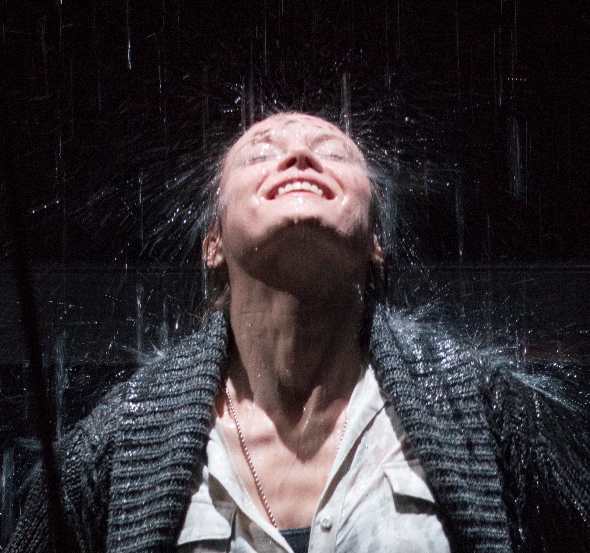
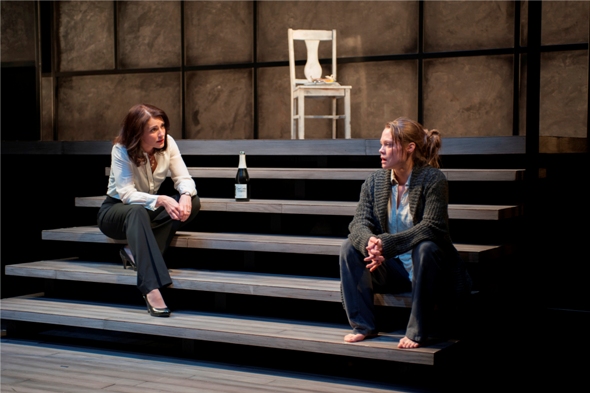

No Comment »
1 Pingbacks »
[…] the virtuosic mind, among them Peter Shaffer’s “Amadeus” at Chicago Shakespeare, David Auburn’s “Proof” at Court, Tom Stoppard’s “Arcadia” at Writers, and Simon Stephens’ […]